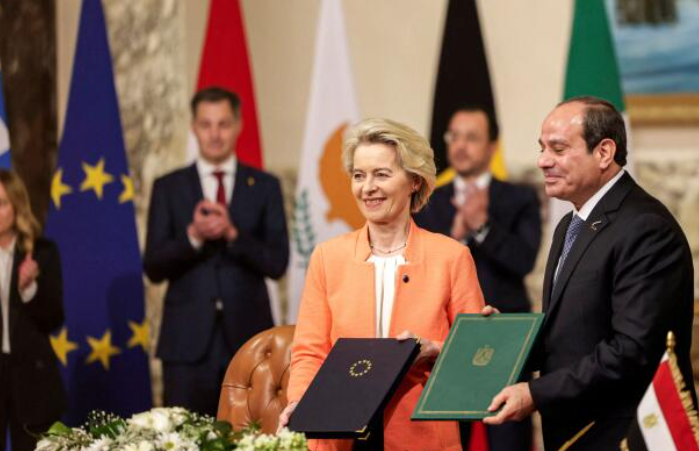EU Unveils Partnership with Egypt
The European Union has announced a landmark partnership agreement with Egypt, elevating the bloc’s relationship with the North African nation and unveiling a substantial funding package to support Egypt’s faltering economy and address shared challenges.
The deal, unveiled during a high-level delegation visit to Cairo, encompasses cooperation in key areas such as renewable energy, trade, security, and managing migration flows.
€7.4 Billion in Loans, Investments and Grants
At the heart of the partnership is a comprehensive funding package totaling €7.4 billion over the next three years. The proposed assistance, designed in close coordination with the International Monetary Fund (IMF), includes:
- €5 billion in concessional loans
- €1.8 billion in investments
- €600 million in grants, including €200 million specifically for managing migration
The majority of the funding is newly allocated, with €1 billion of the macro-financial loan to be delivered this year, subject to approval by the European Parliament. The substantial financial support underscores the EU’s commitment to fostering stability and economic recovery in Egypt, a country of 106 million people grappling with high inflation, foreign currency shortages, and increasing migration pressures.
Addressing Migration Flows and Regional Conflicts
The strategic partnership comes as European governments increasingly worry about the potential for instability in Egypt and its impact on irregular migration to Europe. In recent months, a surge in Egyptians attempting to cross to Europe via Libya has been observed, with the Greek islands of Crete and Gavdos experiencing a steep rise in arrivals from Egypt, Bangladesh, and Pakistan.
Italian Prime Minister Giorgia Meloni, who joined the delegation to Cairo along with EU Commission President Ursula von der Leyen and other European leaders, emphasized that such partnerships were “the best way to address migratory flows.” The EU has already been providing support to Egypt aimed at reducing irregular migration from its north coast, which the country largely shut off in 2016.
Egypt’s strategic importance has been further underscored by its role in regional conflicts. The country is actively mediating between Israel and Hamas in the ongoing war in Gaza, working to increase humanitarian aid deliveries and prevent an Israeli incursion into the heavily displaced area of Rafah. The partnership agreement also comes amid the world’s largest displacement crisis in neighboring Sudan, adding to the urgency of promoting stability in the region.
Balancing Economic Support and Human Rights Concerns
While the strategic partnership aims to bolster Egypt’s economy and address shared challenges, it has also drawn criticism from human rights activists who have long opposed Western backing for Egyptian President Abdel Fattah al-Sisi. Since coming to power a decade ago after overthrowing Egypt’s first democratically elected leader, Sisi has overseen a crackdown on dissidents across the political spectrum and an expansion of state and military control over the economy.
Month: Current Affairs - March, 2024
Category: International / World Current Affairs








